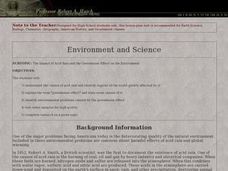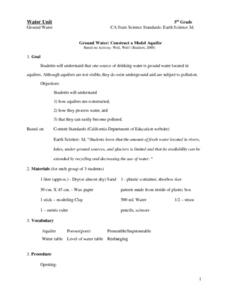Curated OER
Japanese Carp Kites/Children's Day
Students listen to the story "A Carp for Kimiko" and discuss its lesson and theme. They design and create their own carp kite in celebration of Children's Day. They discuss gender discrimination and how that makes them feel.
Curated OER
Ocean Currents
Fourth graders work in groups to research ocean currents and create posters with their findings. They locate the patterns and names of major ocean currents and identify them on a map. Students also use red pencil to show ocean currents...
Curated OER
The Water Cycle
Seventh graders discover how water circulates through the earth and its atmosphere while determine how much of the Earth's water is suitable for drinking. They discover the meaning of evaporation, transpiration, and precipitation and...
Curated OER
Water Currents
Students demonstrate how ocean currents are influenced by changes in density. They discover that temperature and salintiy affect density as well. They participate in a short experiment to end the lesson.
Curated OER
Understanding the pH Cycle within the Aquarium
Students discuss places they have been where the air seemed hard to breathe. They discuss if they could "see" the humidity or smell. Students discuss ways this might relate to the fish in the aquarium. The teacher introduces pH and how...
Curated OER
Photosynthesis: Intake of Carbon Dioxide - Production of Oxygen
Students, after a long-term observation of photosynthesis with aquatic plants, assess the benefits of photosynthesis towards all living organisms. They explain in their own words the two cycles within photosynthesis. Guided discussion...
Curated OER
Using Maps to Make Public Health Descisions Case Study: Harmful Algal Blooms in the Gulf of Mexico
Students are introduced to GIS and its uses. Students participate as public health scientists to deliberate a course of action to explore possible research questions. Pupils interpret spatial data, and make predictions based on GIS data,...
Curated OER
User-friendly rivers
Learners explore and explain their connection to rivers through watersheds. They break into three groups. Each group needs: Blue enamel paint, Miniature objects to simulate a model river system, modeling clay, Tempera paint, Toothpicks...
Curated OER
The Many, Varied, and Unusual Places and Things on Earth
Students discover how energy flows through communities because of the relationship between producers, consumers and decomposers. Examining various ecosystems, they identify the materials that cycle continuously through them. They label...
Curated OER
The Impact of Acid Rain and the Greenhouse Effect on the Environment
Pupils study acid rain and complete several activities that show how it affects the environment. They role play members of the community involved in a major decision involving the protection of the environment.
Curated OER
Water Under the Bridge
Students consider how much water they use on daily basis by investigating and recording their own patterns of water use over two weeks, and discover ways to begin conserving water in their own homes. Culminating field trip to local creek...
Curated OER
Nothing New? A Physical Change
Fifth graders discuss the differences between chemical and physical changes. In groups, they complete experiments and discover how a physical chnage can be reversed. To end the lesson, they review the steps of the water cycle and...
Curated OER
Rainwater Harvesting, A Practice for Puerto Rico?
Students identify the various sources of water in Puerto Rico. In groups, they research the various ways people in the country gather their water. They also analyze the reasoning behind water catchment systems to end the lesson.
Curated OER
Mouthwatering Mollusks
Learners investigate various forms of aquatic life. They use four senses, touch, taste, smell, and observation to explore mollusks. Students cook and taste various types mollusks, such as mussels, scallops, and squid.
Curated OER
Embryological Development Using Medaka Fish
Students analyze and record major events that occur in the development of Medaka fish eggs from fertilization to hatching. In small group, students describe the processes involved, creating a timeline of the major events in the...
Curated OER
A Tail to Tell
Students observe populations of Lumbriculus to discover some of the adaptations that allow them to live successfully along the shores of ponds and marshes. They also design and perform experiments to test proposed hypotheses for these...
Curated OER
Biocomplexity Lab Activity: Creating Salt Water
The lesson seeks to intorduce to students the properties of salt water and how to create salt water. Teacher gives backgound information about salt water to students. From that point, students dscuss what elements are in salt water....
Curated OER
Biocomplexity Lab Activity: Density and Buoyancy of
Students investigate how the density of water changes the buoyancy of
water. Students create a hypothesis about what will happen when placing the
egg into the water.Students can research online different bodies of water (The Red Sea, The...
Curated OER
CREATE A CAVE
Students investigate the concept of caves by conducting an experiment. The lesson contains background information for the teacher. They collect data while making observations and write a review of the concept once the experiment is...
Curated OER
Renewable vs. Non-Renewable Resources
Fifth graders identify renewable vs. non-renewable resources and comprehend why conservation of resources is important. They are asked what they think the words natural and resource mean. Pupils then put the words together to define...
Curated OER
Ground Water: Construct a Model Aquifer
Students recognize that one source of drinking water is ground water located in aquifers. They create a model of an aquifer and summarize their experience in a report.
Curated OER
Don't Trash the Earth
Students experience a hands-on environmental science project. They access about recycling as they collect data on their own family's trash production. Students analyze the data with worksheets, chart the data, and present their findings.
Curated OER
ANIMALS OF ANTARCTICA
Students are introduced to the animals of Antarctica and how they adapt to their environment and the changes of the seasons after being read the story,"Counting Penguins" . They pick an animal and predict how he/she thinks this animal...
Curated OER
Fertilized Death Water
Students investigate the effect of chemicals on Platyhelminthes and planaria development. They observe the growth and development of planaria and investigate what fertilizer can do to living organisms when it is introduced into their...

























